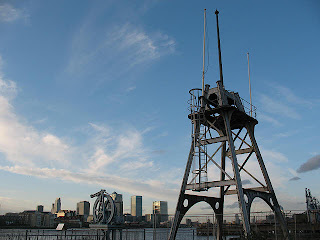Established in the 1700s, the industrial area on the east side of the Greenwich marsh had expanded down river by the early 1800s. The site on which a gunpowder store had originally stood was acquired in 1829 by the Enderby family, Bermondsey tanners who had made money from a white lead manufacturing process and then married into the whaling trade.
On this site in Greenwich, less than a mile from the town centre, the Enderbys built a ropewalk (a long work area used for making ropes) and a factory for making sails and cordage, Enderby's Hemp Rope Works. On the riverfront they built Enderby House, dating from the 1830's. In the 1850's the site was bought by Glass Elliot, a pioneering company in the the new submarine cable industry, and here the first Atlantic cable was made. Submarine cables were made at Enderby's Wharf until 1975, and part of the site is still in use today by its present owner, Alcatel Submarine Networks.
http://atlantic-cable.com/CableCos/EnderbysWharf/EnderbysMap.gif
I was particular intrigued by the Cable machinery near to the Thames river. To me the cable machinery could be representative of an untold past of the area, and also be a metaphor for progress on the pensinsula.
There are closeups of the Cable Holdback machinery on the site, which I include here:
(I had the idea of creating a visual of this Cable Holdback that could be rendered in CSS3 as a 2d animation and later Three.js. as a 3D animation. However I wanted to also consider interactivity and projection as factors to integrate later on. )







No comments:
Post a Comment